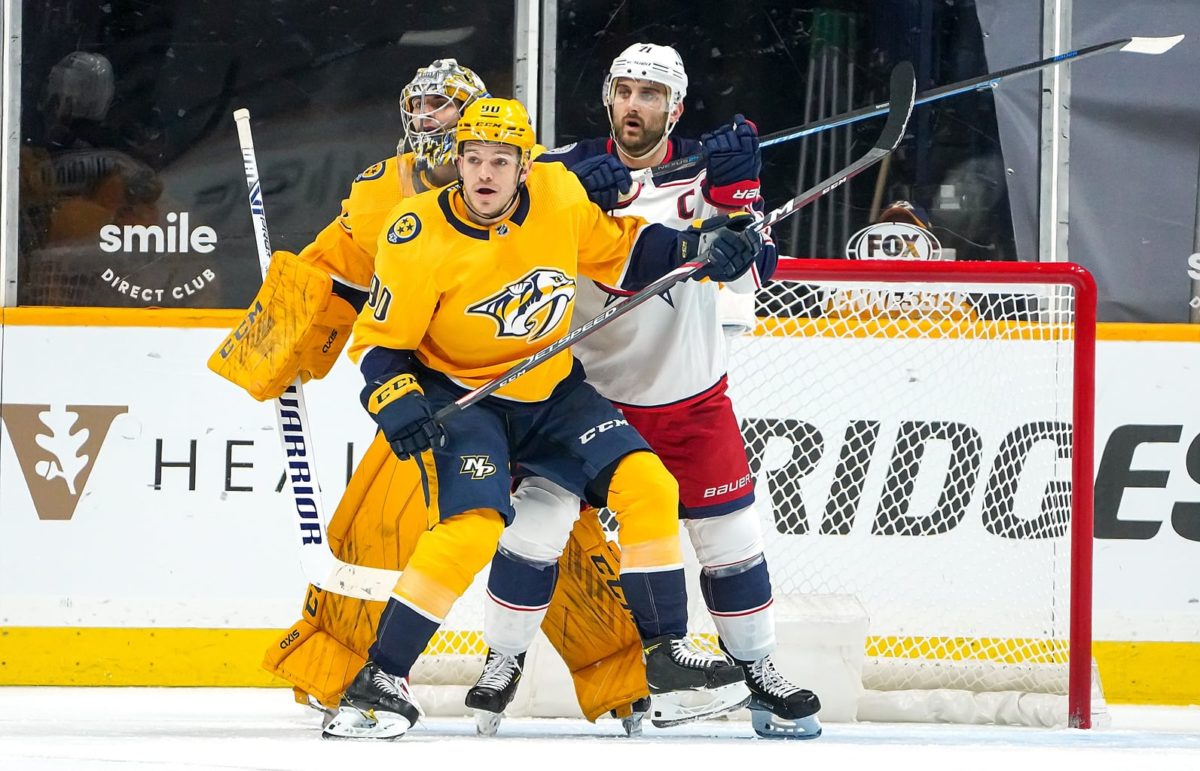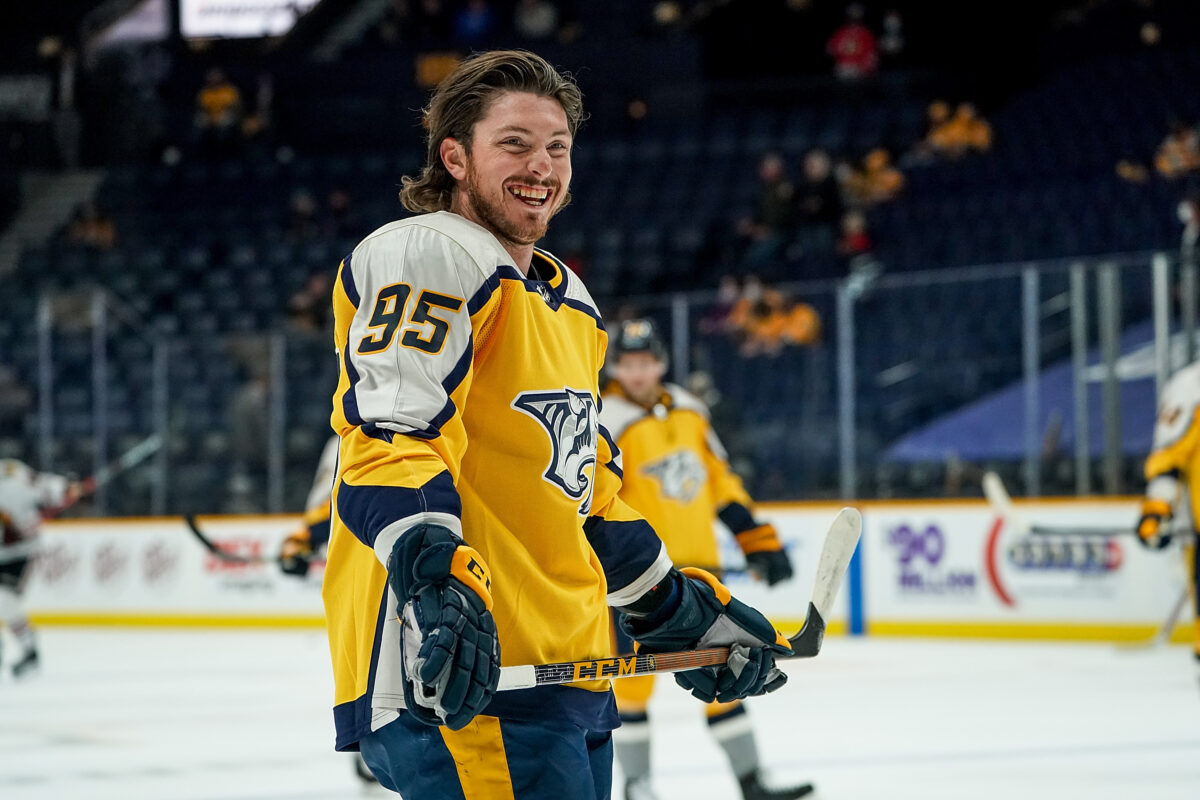Christmas came early for the Nashville Predators, as they took to the holiday break on a seven-game winning streak. It was a little sooner than expected as the NHL had to suspend all action due to the most recent outbreak of COVID-19. However, nothing was gift-wrapped for the Predators during that run. Five of those seven games ended in a one-goal differential and two of which required overtime. Teams who were beatable on paper, yet those games would test Nashville’s resilience.
With the last four games postponed, the Predators have been out of action for the last 11 days and will resume play on Wednesday, Dec. 29, when they visit the Washington Capitals. They’ll play the second half of a back-to-back against the Columbus Blue Jackets the following night, completing the calendar year in the process.
Related: Capitals COVID List Grows, Defense Depleted
Before the road trip, the Predators sat just outside the wild card race and were battling for position. With the last road trip and the back-to-back against the Colorado Avalanche and Chicago Blackhawks, they now find themselves in the second spot in the Central Division and as one of the hottest teams in the league. They saw players like Mattias Ekholm and Thomas Novak break their goalless droughts by scoring their first of the season, continued to get strong performances from their usual suspects in Filip Forsberg and Roman Josi, and had Juuse Saros come up big in moments when the team needed him the most.
As the clock strikes midnight and the world welcomes in 2022, here are some new year’s resolutions for a Predators team that is showcasing some of the best play the league has seen all year.
Take Advantage of the January Schedule
The Predators will play 13 games in 27 nights in January, which may seem like a busy workload. In that span, they’ll have three instances of two consecutive nights off. Those pair perfectly when you consider that they face teams like the Avalanche and the Vegas Golden Knights, two teams currently in the mix for playoff positioning. Speaking of which, of their 13 games in January, seven of them come against teams on the outside looking in, making this an opportune time to take advantage of a tightly-packed schedule.

(Photo by John Russell/NHLI via Getty Images)
It will also be a chance for the Predators to separate themselves from the teams within their division, as they take on the Avalanche, the Winnipeg Jets and the St. Louis Blues. The Predators are tied in points with the Blues, sit three points ahead of the Avalanche (who have three games in hand on Nashville), and are six points ahead of the Jets. These are moments that can set a team up for excellent positioning, and the Predators simply cannot afford to squander them. Winning all three — and avoiding overtime at all cost — will be a top priority while also stockpiling points against the lower-ranked teams like the Blackhawks and the Arizona Coyotes.
One last thing to take into consideration is the number of games that have been postponed so far for Nashville, which is currently at six games. February was set up to allow for a three-week break to allow NHL players to participate in the Winter Olympics in Beijing, resulting in Nashville only having three scheduled games. Unfortunately, due to the pandemic and the heavy quarantine restrictions, the NHL and NHLPA opted out of the Olympics, thus making February a prime opportunity to make up those games and schedule the six lost games in the 22 days that should have been empty.
Get More Results From Ekholm
If there’s one person who can tell you that Ekholm hasn’t been himself this season, it’s the man himself. Since signing his extension, one that kicks in next season and pays him a healthy $6.25 million per year, Ekholm’s play has dropped off significantly. His goal against Colorado on Dec. 16 was his first of the year and his third point in the last 15 games. While his defensive side hasn’t looked too bad, particularly his ability to limit high-danger scoring chances and cover the slot, his physical side to the game hasn’t been the same.
Back in October, Dom Luszczyszyn of The Athletic highlighted concerns about a player who appeared to have been regressing before the season had even started.
The concern, for the most part, was Ekholm’s slow decline compared to his trajectory and the fact that the analytics compare to players like Johnny Boychuk, Christian Ehrhoff and Jay Bouwmeester, defensemen who all excelled on a physical level but started to show their age and take a step down. His contract was also similar to that of Ryan Ellis‘ deal, which, in turn, forced general manager David Poile’s hand in trading him to the Philadelphia Flyers, but Ekholm was the least likely between the two to be hurt and also remain more physical.
The Predators are going to need Ekholm to regain some of his form if the team wants to take the next step. Currently, it’s clear that Nashville is undergoing what one would call a “competitive rebuild.” A restructuring of team dynamic while still maintaining chemistry and remaining in the hunt for a playoff spot. They’ll need Ekholm’s physicality and strong defensive play for that to happen, and it’s something we just haven’t seen so far this season.
Stay Healthy and Away From COVID-19
This one goes without saying, but the pandemic has hit the NHL heavy and swiftly, and Nashville will need to remain vigilant in keeping their players healthy and active. It was just two weeks ago that the Predators had seven players on the COVID protocol list; Mikael Granlund, Ryan Johansen, Nick Cousins, Philip Tomasino, Michael McCarron, Matt Luff and Ben Harpur, plus the coaching staff consisting of head coach John Hynes, as well as assistant coaches Todd Richards, Dan Lambert, Dan Hinote and Ben Vanderklok. Plus, with Matt Duchene still day-to-day with an upper-body injury, this leaves the team with some decisions to be made for their lineup.
Rocco Grimaldi, Cody Glass, Mathieu Olivier, Cole Smith and Kole Sherwood were all recalled from the Milwaukee Admirals just before the holiday break and appeared in the 3-2 overtime victory over the Blackhawks; however, all but Glass were sent back down. With last year’s taxi squad situation brought back by the NHL, the one used during the 56-game season to allow for teams to recall players and expand their roster in case of COVID-related issues, the Predators now have some choices should their team be struck even further.
From Dec. 26 until the last game before the NHL All-Star break, teams will be allowed to run a six-player taxi squad, with no player allowed to be on it for more than 20 days. This allows the Predators to have defensive options like Frederic Allard, Jeremy Davies and David Farrance, while options at the forward position include Egor Afanasyev, Cole Schneider, Grimaldi, Olivier, Sherwood and Smith.
A healthy team is a happy team, and the Predators stand a better chance at a deep push for the playoffs with the likes of Duchene, Johansen and Granlund all on the active roster. The only major concern at the moment is Duchene’s non-COVID injury and the hypothetical situation where Saros is hit with sickness and has to sit out for 1-2 weeks.

The current season has come as somewhat of a surprise given what the Predators looked like going into it. After a seven-game winning streak, teams are finally taking notice of a young and hungry Nashville team that isn’t backing down any time soon. Amidst their competitive rebuild, they still ice a team capable of beating the best while boasting a prospect pool that shows signs of a promising future. One thought hangs in the balance, though: when is it Nashville’s time? Perhaps this season, we’ll get that answer.